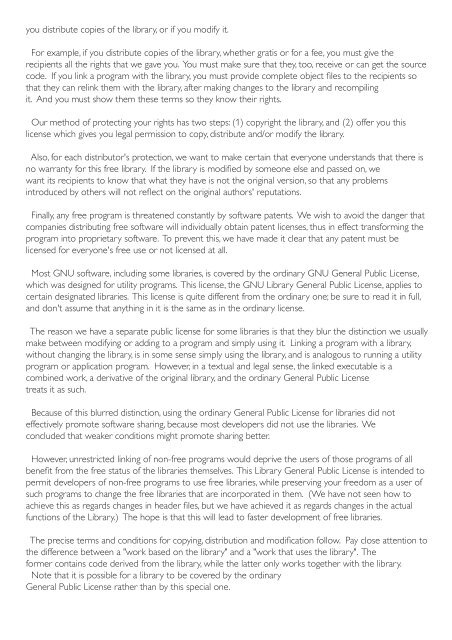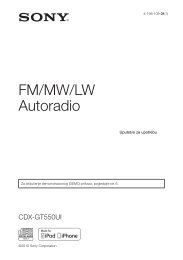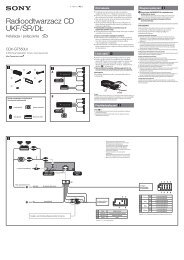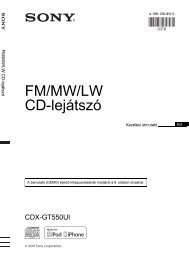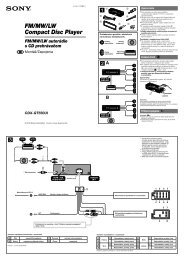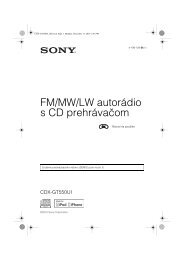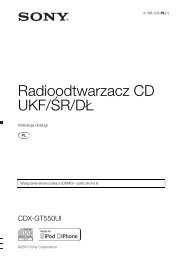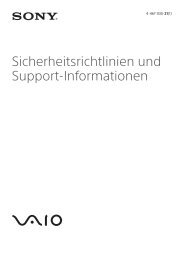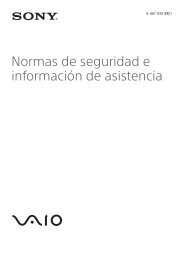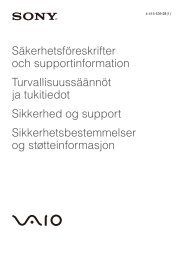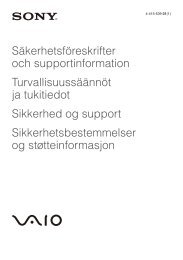Philips Streamium Microchaîne hi-fi sans fil - Mode d’emploi - DAN
Philips Streamium Microchaîne hi-fi sans fil - Mode d’emploi - DAN
Philips Streamium Microchaîne hi-fi sans fil - Mode d’emploi - DAN
Create successful ePaper yourself
Turn your PDF publications into a flip-book with our unique Google optimized e-Paper software.
you distribute copies of the library, or if you modify it.<br />
For example, if you distribute copies of the library, whether gratis or for a fee, you must give the<br />
recipients all the rights that we gave you. You must make sure that they, too, receive or can get the source<br />
code. If you link a program with the library, you must provide complete object <strong>fi</strong>les to the recipients so<br />
that they can relink them with the library, after making changes to the library and recompiling<br />
it. And you must show them these terms so they know their rights.<br />
Our method of protecting your rights has two steps: (1) copyright the library, and (2) offer you t<strong>hi</strong>s<br />
license w<strong>hi</strong>ch gives you legal permission to copy, distribute and/or modify the library.<br />
Also, for each distributor's protection, we want to make certain that everyo<strong>ne</strong> understands that there is<br />
no warranty for t<strong>hi</strong>s free library. If the library is modi<strong>fi</strong>ed by someo<strong>ne</strong> else and passed on, we<br />
want its recipients to know that what they have is not the original version, so that any problems<br />
introduced by others will not reflect on the original authors' reputations.<br />
Finally, any free program is threate<strong>ne</strong>d constantly by software patents. We wish to avoid the danger that<br />
companies distributing free software will individually obtain patent licenses, thus in effect transforming the<br />
program into proprietary software. To prevent t<strong>hi</strong>s, we have made it clear that any patent must be<br />
licensed for everyo<strong>ne</strong>'s free use or not licensed at all.<br />
Most GNU software, including some libraries, is covered by the ordinary GNU Ge<strong>ne</strong>ral Public License,<br />
w<strong>hi</strong>ch was desig<strong>ne</strong>d for utility programs. T<strong>hi</strong>s license, the GNU Library Ge<strong>ne</strong>ral Public License, applies to<br />
certain designated libraries. T<strong>hi</strong>s license is quite different from the ordinary o<strong>ne</strong>; be sure to read it in full,<br />
and don't assume that anyt<strong>hi</strong>ng in it is the same as in the ordinary license.<br />
The reason we have a separate public license for some libraries is that they blur the distinction we usually<br />
make between modifying or adding to a program and simply using it. Linking a program with a library,<br />
without changing the library, is in some sense simply using the library, and is analogous to running a utility<br />
program or application program. However, in a textual and legal sense, the linked executable is a<br />
combi<strong>ne</strong>d work, a derivative of the original library, and the ordinary Ge<strong>ne</strong>ral Public License<br />
treats it as such.<br />
Because of t<strong>hi</strong>s blurred distinction, using the ordinary Ge<strong>ne</strong>ral Public License for libraries did not<br />
effectively promote software sharing, because most developers did not use the libraries. We<br />
concluded that weaker conditions might promote sharing better.<br />
However, unrestricted linking of non-free programs would deprive the users of those programs of all<br />
be<strong>ne</strong><strong>fi</strong>t from the free status of the libraries themselves. T<strong>hi</strong>s Library Ge<strong>ne</strong>ral Public License is intended to<br />
permit developers of non-free programs to use free libraries, w<strong>hi</strong>le preserving your freedom as a user of<br />
such programs to change the free libraries that are incorporated in them. (We have not seen how to<br />
ac<strong>hi</strong>eve t<strong>hi</strong>s as regards changes in header <strong>fi</strong>les, but we have ac<strong>hi</strong>eved it as regards changes in the actual<br />
functions of the Library.) The hope is that t<strong>hi</strong>s will lead to faster development of free libraries.<br />
The precise terms and conditions for copying, distribution and modi<strong>fi</strong>cation follow. Pay close attention to<br />
the difference between a "work based on the library" and a "work that uses the library". The<br />
former contains code derived from the library, w<strong>hi</strong>le the latter only works together with the library.<br />
Note that it is possible for a library to be covered by the ordinary<br />
Ge<strong>ne</strong>ral Public License rather than by t<strong>hi</strong>s special o<strong>ne</strong>.


